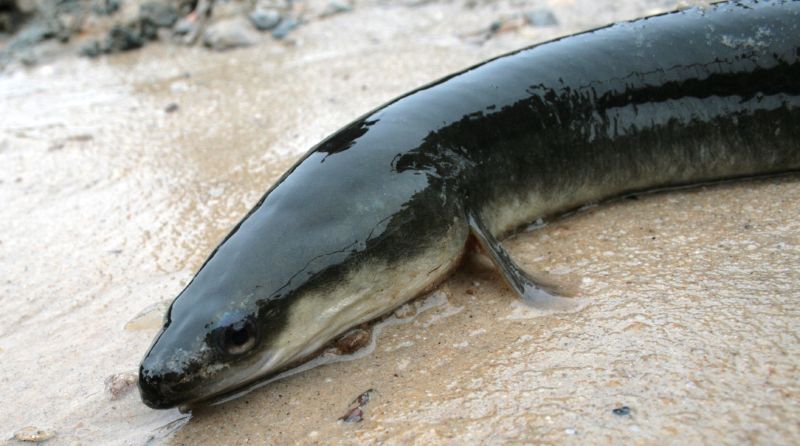SOUTH CAROLINA
 Three defendants plead guilty on Monday in federal court in Charleston to trafficking more than $740,000 worth of juvenile American eels aka “elvers” or “glass eels,” in violation of federal law, according to officials.
Three defendants plead guilty on Monday in federal court in Charleston to trafficking more than $740,000 worth of juvenile American eels aka “elvers” or “glass eels,” in violation of federal law, according to officials.
Harry Wertan, Jr., Mark Weihe and Jay James each pleaded guilty to selling or transporting elvers in interstate commerce, which they had harvested illegally in South Carolina.
The pleas were the result of “Operation Broken Glass,” a multi-jurisdiction U.S. Fish and Wildlife Service investigation into the illegal trafficking of American eels.
The offenses in the case are felonies under the Lacey Act, each carrying a maximum penalty of five years’ incarceration and a fine of up to $250,000 or both.
The investigation has resulted in guilty pleas for ten individuals whose combined conduct resulted in the illegal trafficking of more than $2.6 million worth of elvers, according to officialsl
“We will not allow the rivers of the United States to be the poaching grounds for international seafood markets,” said Assistant Attorney General John Cruden. “The American eel is an important but limited natural and economic resource that must be protected. Trafficking only undercuts the toil and honest efforts of those who obey the law.”
“This case underscores the role U.S. citizens often play in wildlife trafficking and demonstrates that this deadly trade does not solely impact large, charismatic mammals in distant countries,” said Director Dan Ashe for the Wildlife Service. “U.S. Fish and Wildlife Service law enforcement agents work tirelessly to save wildlife from the threat traffickers pose here at home, and together with the Department of Justice, bring these individuals to justice for their illegal activities.”
Eels are highly valued in east Asia for human consumption.
Historically, Japanese and European eels were harvested to meet this demand; however, overfishing has led to a decline in the population of these eels. As a result, harvesters have turned to the American eel to fill the void resulting from the decreased number of Japanese and European eels.
American eels spawn in the Sargasso Sea, an area of the North Atlantic Ocean bounded on all sides by ocean currents.
They then travel as larvae from the Sargasso to the coastal waters of the eastern United States, where they enter a juvenile or elver stage, swim upriver and grow to adulthood in fresh water. Elvers are exported for aquaculture in east Asia, where they are raised to adult size and sold for food, officials said.
Harvesters and exporters of American eels in the United States can sell elvers to east Asia for more than $2000 per pound.
Because of the threat of overfishing, elver harvesting is prohibited in the United States in all but three states: Maine, South Carolina and Florida.
Maine and South Carolina heavily regulate elver fisheries, requiring that individuals be licensed and report all quantities of harvested eels to state authorities.
Although Florida does not have specific elver-related regulations, the limited population of elvers in Florida waters makes commercial eel fishing impossible, according to authorities.
“This investigation is an outstanding example of the dedication and ingenuity shown by multiple agencies working together to expose and curtail the illegal trade of American eels,” said Special Agent-in-Charge Luis Santiago Southeast Region for Wildlife Service. “Today’s pleas are a success in our collective efforts to conserve and protect an important American fishery.”
*****Operation Broken Glass was conducted by the USFWS and the Justice Department’s Environmental Crimes Section in collaboration with the Maine Marine Patrol, South Carolina Department of Natural Resources Law Enforcement Division, New Jersey Division of Fish and Wildlife Bureau of Law Enforcement, Connecticut Department of Energy and Environmental Protection Conservation Police, Virginia Marine Resources Commission Police, USFWS Refuge Law Enforcement, National Oceanic and Atmospheric Administration Office of Law Enforcement, Massachusetts Environmental Police, Rhode Island Department of Environmental Management Division of Law Enforcement, New York State Environmental Conservation Police, New Hampshire Fish and Game Division of Law Enforcement, Maryland Natural Resources Police, North Carolina Wildlife Resource Commission Division of Law Enforcement, Florida Fish and Wildlife Conservation Commission, Yarmouth, Massachusetts Division of Natural Resources, North Myrtle Beach, South Carolina Police Department and the Atlantic States Marine Fisheries Commission.

